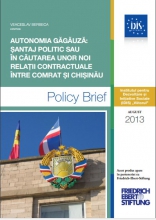Gagauzia Autonomy: Political Blackmail or in Search of New Contractual Relations between Comrat and Chisinau
Gagauzia Autonomy: Political Blackmail or in Search of New Contractual Relations between Comrat and Chisinau
Author(s): Veaceslav Berbeca
Subject(s): Inter-Ethnic Relations, Peace and Conflict Studies
Published by: IDIS VIITORUL Institutul pentru Dezoltare şi Initiative Sociale
Keywords: federalism;
Summary/Abstract: The special status of Gagauzia provides the autonomous territorial unit with large self-government competence. Thus, the Popular Assembly is the Gagauzia representative authority, which has been vested with the right to adopt normative acts within the limits of its competence. Also the population of this region elects for a 4-year period a Governor to whom all the Gagauzia public authorities are subordinated. Mention should be made that several important state positions in the territorial unit are nominated by the Popular Assembly, which is investing the local legislative body with an important role as far as the personnel policy of Gagauzia is concerned. Even if more than 18 years have passed since this political compromise between the centre and the Gagauz region was reached, periodically, conflict signs between the Chisinau and Comrat authorities emerge on different occasions. Over the last year though, the Gagauz political elite has expressed certain dissatisfaction which reminds about the events from the early ‘90s. A conflict is also made obvious between the most important institutions of the autonomy – the Popular Assembly and the Gagauzia Governor (Bashkan). The political fight within the autonomy has direct impact on the relations between the Comrat political elite and the central authorities. This interconnection complicates the situation in the autonomy as well as the relations between the region and the center. The modality of electing these two important institutions from Gagauzia- the Popular Assembly and the Governor (Bashkan) - is a permanent conflict element between the legislative and executive authorities in the situation when the majority in the local legislative and the Bashkan do not represent the same political formation. In other words, in contrast to the national legislation where the state president is elected by the Parliament, in the Administrative Territorial Unit (UTA) of Gagauzia, the members of the Popular Assembly and the Governor are elected directly by the population of the three rayons which make the Gagauz Autonomy.
Series: IDIS Policy Briefs
- Page Count: 5
- Publication Year: 2013
- Language: English
- Content File-PDF

